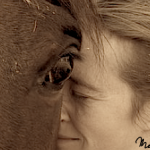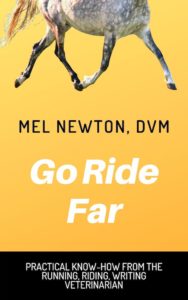Cha-ching
| December 29, 2010 | Posted by Melinda under Uncategorized |
It’s useful to look at “sister” sports to explore possibilities for endurance. Eventing is a “sister” sport because of what it demands from the horse, among other reasons. Another sport I consider a “sister” sport is that of ultramarathon running.
I’ve toyed with the idea of running ultramarathons (and once expressed that idea to my mom, who said “get another horse”) and generally keep an ear out for anything interesting occuring in that sector.
A blog recently addressed a topic I’ve certaintly had on my mind. Read it here: http://akrunning.blogspot.com/2010/12/prize-money.html and then tell me what you think.
Ultramarathoning started out much like endurance – a bunch of crazy people trying to go further than anyone else just because. $$ changes a sport. Good and Bad changes. I can see both sides and am totally undecided whether I think it’s a good thing or not.









I’ve gotta side with Anon – there are a LOT of expenses involved in putting on a ride. And many of those are fixed expenses – your BLM fee doesn’t go down just because you only had 20 riders turn out one rainy day. RMs get to keep their profit, but they sure don’t get rich doing it, and it’s an overwhelming amount of work.
But anyway, on the original point of the post (which I mean to comment on way back when but ran out of time for) – I think (ultra)running has a lot deeper pockets. The only 800 lb gorilla* remotely connected to endurance is Easyboot, and they seem to be moving in the same direction with the free Tevis entries last year. Who else is going to put up money? I really doubt Stonewall or Henry Griffin has the cash to put up a purse. Maybe the trailer manufacturers, if they only realized what a good sub-market endurance is.
The whole discussion is kind of academic to me anyway. It comes back to the ride vs race debate – just riders don’t really care about prizes (unless it’s a door prize! I think more rides should have door prizes!!) Only racers** care.
*I don’t mean anything negative, just that they’re the biggest vendors by far.
**Again, nothing negative implied. And no blog comment needs more than two footnotes so I’ll shut up now.
Sorry Mellinda, just one last thing! Well if you go to the AERC site and poke around a bit there is a whole section on Ride sanctioning. It cost’s $35 dollars to put on 2 distances and $10 for each additional distance. They need to pay $5 per rider, per distance. $3 per rider for a drug testing fee (Except California rides) Here is a list of things that RM must also pay for: Porta Potties (1 outhouse per 25 people), tools for trail clearing, gas/diesel to run generators or the tools for clearing trail, Ribbons, chalk, possibly glow sticks, a water truck to haul water, troughs for drinking water, buckets for sponging, sponges, Hay and carrots, Paper for Maps and ride info, Ink to print these, Vet Cards, Grease pens for marking the numbers on horses, Stethoscopes for P&R volunteers, Farriers (pay them to be their and then riders pay for the service of them).
You are misunderstanding me.
I do not want to “earn” money, and I’m not talking about FEI. I simply would like to find out what the entry fees are spent on and why RMs don’t share the profits with their riders. The reason may be quite obvious, if, as you say, there is little or no profit to share.
I don’t know who you are so I’m not quite ready to believe your claim but it’s quite possible you can’t make any money putting on a ride, and I will easily be convinced. I already took camp and trail fees into consideration when doing my crude “calculations”, but BLM and State Park permits cannot be that high as it is PUBLIC land we all already pay taxes for!? We are supposed to use this land! In any case, these (ranger/usage) fees probably vary a lot from ride to ride.
I remember riding with a couple who used to put on an annual ride until a couple of years ago. Will email them to get to the bottom of it!
In any case, sorry, Melinda for hijacking your blog! I guess I’m feeling particularly poor these days… And the storm outside just makes me feel crayzzeeeh 😉
The profit is little, if at all for RM’s. You still need a treatment vet, and 1-2 other vets regardless of the amount of entires. I am a West region rider, and many of the base camps are a huge chunk of change. getting either BLM permits or state park permits are more than 3 vets. You seem to overlook a few facts i presented, and only point out the stuff that makes your point. Many of the rides are established, but many are very close together, so riders are stretched thin or have to chose between one rider over another. Yes earning money would be nice, if you want to go into FEI and see what it takes to earn money. You will find that you are putting way more money out then you are getting.
Anonymous 1: Ridecamp discussions are a bit of a pain because of the strange format… They’re so hard to follow and I rarely visit anymore. As for my tone – people get defensive when you hit a nerve, not when they can simply explain to an “uninitiated” person how something works. There may be many hidden expenses I missed so it would be good to know that the profit is not nearly as high as it seems it may be.
Anonymous 2: In Region West there are quite a few rides where the 25s and 50s combined total a hundred people or thereabouts, but I simply used the number for easier math. You need fewer vets, less people food, less hay & water when you have fewer entries, so your expenses go down as well. But I understand it’s the same amount of hard work, headaches with riders, weather, trail markings, etc., and agree the RM should get paid something. However, many rides in this region are very well established and the RMs have been putting them on for years and don’t reinvent the wheel each time. You can’t compare a brand new ride with an established one and I’m talking about the latter.
My intention was not to needle ride managers for making a profit, I just wanted to find out why they decide not to share some of it like it’s done in the Western competitions around here (so my barnmate tells me.) I understand that Endurance is an amateur sport but it sure would be nice to have the incentive to make gas money and entry fees back. No?
I have never been to a ride other than tevis that had 100 people. Most rides are under 50 riders, if they are lucky. you have to account for junior riders who get a discount at most rides, with 50% off, $20 or something like that. One ride gives juniors free entries to encourage younger participants to help build the sport. Many times Ride managers get a discount so that is even more money you need to deduct. Their are fee’s through AERC you need to pay to put on a ride as well.
The best way to get some good hard data on this topic would be to put on a ride. I don’t think you would be saying “so no need to be defensive” if you put in the work they did. AERS is not a money earning sport, it is considered an Amateur Sport. I am not saying it is amateur, but compared to FEI it is. FEI championship rides are money earning. Ask Maria Ponton how much she walked away with after this years win, and several other huge wins like a WEC, and two WEG’s.
Ines, I think you should post that question/statement on Ridecamp. You might want to change the tone, however, because it’s hard not to get defensive in response to your post.
And just to bring it back to the blog post Melinda linked to: Having a corporate sponsor is yet another beast I didn’t even want to tackle… Right now I’m just curious about plain old entry fees and how much it costs to put on a ride.
Maybe I’m just naive about the price of things or forgetting an important line in the ride budget?
Yes, let’s talk about the financial side of Endurance rides! I would like to be more educated because I don’t understand where the entry fees go? Everyone says it’s really expensive to put on a ride but no one really comes forth with hard data? I understand how expensive it is to put on Tevis, but what about your regular “no frills ride” where sometimes you don’t even get a warm meal and there are no amenities?
Let’s say, just for the sake of simple math, 100 people sign up for a one-day ride (various distances) and on average they pay a $100 entry fee. That’s $10,000. Let’s say there are 5 vets and they get paid $400 for the day – that’s $2,000. Then there is one catered meal for let’s say $15 per person, so $1500. Then the participation prize, let’s say a hat, bought in bulk, so $5 at the most. That’s another $500, plus a small prize for BC and 1st place.
I guess there are also trail and/or camping fees (sometimes), the water truck rental, and maybe a small staff that gets paid. And of course the AERC fees. But doesn’t that still leave almost HALF the entry fees?
In reining and other Western competitions, 50% of the entry fees go right back to the competitors, so even if it’s a small show I assume you can make some gas money and your entry back. I wish it was the same in Endurance…
So, let’s discuss! Please, ride managers, if you’re out there, weigh in and break it down. I totally agree you should pay yourself something for the effort, so no need to be defensive, but what are your reasons for not paying out a bit of cash, to let’s say at least the Top Ten (or even Top Twenty) even if that cuts into your profit?
Please don’t yell at me for bringing this up. I genuinely would like to know as I have visions of putting on a ride myself one day… In which Kerrits would be the main sponsor and you’d all get really cool riding gear 😉
You should rent Running on the Sun if you haven’t seen it already. Interesting documentary!
My daughter is training for one of those to be ran in Central Oregon next year. The whole family is going to fly over there, visit our relatives and watch her try not to kill herself.